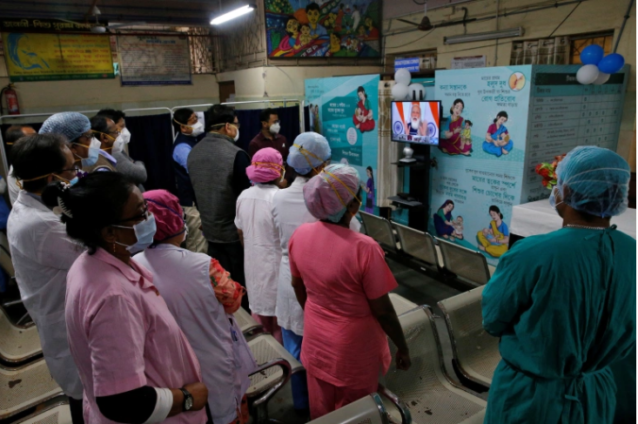India, home to 1.3 billion, is aiming to inoculate about 300 million people by July.
India launched one of the world’s largest coronavirus vaccination drives on Saturday as the coronavirus pandemic spread at a record pace and global COVID-19 deaths surged past two million.
Indian Prime Minister Narendra Modi, who addressed healthcare workers through video conferencing, will not immediately take the vaccine himself as India is initially prioritising nurses, doctors and others on the front line.
“We are launching the world’s biggest vaccination drive and it shows the world our capability,” Modi said in his address. He implored citizens to keep their guard up and not to believe any “rumours about the safety of the vaccines”.
“Please do not start being careless once you get vaccinated, do not take off your mask or forget social distancing,” said Modi.
The sheer scale has its obstacles. For instance, India plans to rely heavily on a digital platform to track the shipment and delivery of vaccines. But public health experts point out the internet remains patchy in large parts of the country, and some remote villages are entirely unconnected.
India gave the nod for emergency use of two vaccines: one developed by Oxford University and UK-based drug-maker AstraZeneca, and another by Indian company Bharat Biotech on January 4. Cargo planes flew 16.5 million shots to different Indian cities last week.
Health experts worry the regulatory shortcut taken to approve the Bharat Biotech vaccine without waiting for concrete data that would show its efficacy in preventing illness from the coronavirus could amplify vaccine hesitancy.
At least one state health minister has opposed its use.
India’s health ministry has bristled at the criticism and said the vaccines are safe, but maintains that health workers will have no choice in deciding which one they get.
According to Dr SP Kalantri – director of a rural hospital in Maharashtra, India’s worst-hit state – such an approach was worrying because he said regulatory approval was hasty and not backed by science.
“In a hurry to be populist, the government [is] taking decisions that might not be in the best interest of the common man,” Kalantri said.
Against the backdrop of the rising global COVID-19 death toll – it topped two million on Friday – the clock is ticking to vaccinate as many people as possible. But the campaign has been uneven.
India is second to the United States with 10.5 million confirmed cases, and ranks third in the number of deaths, behind the US and Brazil, with 152,000.
More than 35 million doses of various COVID-19 vaccines have been administered around the world, according to the University of Oxford.
While the majority of COVID-19 vaccine doses have already been snapped up by wealthy countries, COVAX – a UN-backed project to supply shots to developing parts of the world – has found itself short of vaccine, money and logistical help.
As a result, the World Health Organization’s chief scientist warned it is highly unlikely that herd immunity – which would require at least 70 percent of the globe to be vaccinated – will be achieved this year. As the disaster has demonstrated, it is not enough to snuff out the virus in a few places, experts say.
Latest Stories
-
US House passes Trump’s ‘big, beautiful’ tax and spending bill
17 minutes -
Nigeria’s ruling party endorses President Tinubu for 2027 re-election
27 minutes -
‘We need a law to stop abuse of mineral royalties’ – Chamber of Mines boss
42 minutes -
‘Mineral royalties stay in Accra while mining communities rot’ – Chamber of Mines boss
1 hour -
‘But for mining, Ghana wouldn’t be here today’ – Chamber of Mines CEO laments neglect
2 hours -
It’s not mining company’s job to build skyscrapers’ – Chamber boss on community development
2 hours -
Tumu Community Cup: Soccer Babies to face Nabulo in opener as 24 Hours draw Tarsor
3 hours -
US Congress moves to block California ban on petrol-only cars
3 hours -
Modric to leave Real Madrid after Club World Cup
3 hours -
Trump’s image of dead ‘white farmers’ came from Reuters footage in Congo, not South Africa
3 hours -
Four dead, several missing in record Australia flooding
5 hours -
Kid Cudi testifies at Diddy trial about Molotov cocktail attack
5 hours -
‘We’re losing to Kenya and Ivory Coast because of bad tax policy’ – Acting Chamber of Mines boss
5 hours -
Police arrest suspect in gruesome murder of University of Education lecturer in Winneba
6 hours -
Joy News gets results: Nhyiaeso MP constructs a 33-unit classroom block for State Experimental School in Kumasi
6 hours

